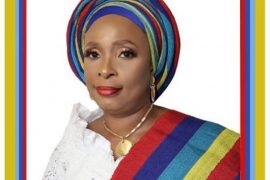With about 415 million diabetic patients as against the 34 million patients living with HIV, the drive to curb the widespread of Diabetes has not been given much attention. This is one of the reasons that led the First Lady of South Africa Her Excellency, Bongi Ngema-Zuma to set up a foundation to cater for the needs of Diabetic patients, as well as create much-needed awareness about the disease.
In an exclusive interview with Amazons Watch Magazine, The First Lady sheds light on her dreams to rid South Africa from diabetes, her views on marginalization along gender lines, as well as solutions to some of the problems faced by women in Africa. Except:
In a few sentences, please describe the person of BONGI NGEMA-ZUMA.
She is a warm, caring, friendly, conscientious, focused, and most importantly a God-fearing and serving-woman.
Did you have any fears, growing up as a young girl? What were some of your choice dreams and aspirations?
Among the things I grew up fearing were lightning and thunder because of their deadly effects, as well as losing loved ones, especially my mother who was my role model. I think life experiences and the fact that my mother used to discuss openly with us as children, encouraging us to face our fears head-on. I used to dream of becoming a school teacher, this being the role I used to take whenever we played as neighbourhood children. Also, my late aunt who had been one of the best teachers in my township (Umlazi) was my great inspiration.
The Bongi Ngema-Zuma Foundation was birthed as a result of your personal experience with your mother. Can you kindly share with us how it all began and some of the high and low moments you have had on this journey?
At home, we grew up knowing about diabetes because of my mother and my paternal aunt, both of whom lived with this disease for many years, but we would not talk much about it, except that Mom dreaded the likelihood of a resultant amputation. From this experience, I gradually developed a desire to do something about diabetes. In 2010, when I thought I was going to pursue MBA studies, my research topic on the impact of diabetes on the economy led me to find out a lot of information about this disease. Besides, I have always been a philanthropist, from my teenage years. Armed with a passion for philanthropy and research information, I then decided to establish the Foundation.
My low moments have always been around very limited financial support for dealing with diabetes, compared to billions poured into HIV projects. It is estimated that there are about 415 million people who have diabetes, versus 34 million with HIV, yet the skewness in funding still continues. This requires a paradigm shift. On the other hand, the high moments have been about the reception the Foundation has been getting from my country’s Departments of Health, both national and provincial, as well as the various diabetes organisations in South Africa and internationally. The Foundation is recognized by the International Diabetes Foundation. I am also blessed to be surrounded by good friends with diverse expertise, and dedicated volunteers throughout the country.
Being a First Lady is very demanding, with lots of expectation from the people. What is the driving force that keeps you on the job on a daily basis and makes you stand out in your work, amidst all the challenges and high expectations?
Although First Lady duties revolve around the President’s activities and schedule, there is a reasonable amount of flexibility to allow me valuable time for the Foundation. I’m driven by the love for and need to support my husband – Mr President on the one hand, in a stately and gracious manner as possible, and on the other hand, a commitment to make a life-saving contribution to society, through the Foundation, in the face of an escalating diabetes challenge. I would say, attention to detail, focus on results and the grace with which I apply myself to make me stand out.
What were some of the challenges you encountered as a result of the transition from regular corporate business life to that of philanthropic activities; and how did you surmount them?
The task of setting up an NGO was laborious and challenging as I had to navigate through registration processes, and use own savings from my corporate life to fund the office. My passion and the zeal to address the diabetes challenge, as well as the management experience I had picked up from the corporate sector saw me through the whole journey. Not to mention the love and support from family and special friends.
Your love for fashion cannot go unnoticed especially with the ‘hats and heels’ themed event. Based on your experience, how can women successfully use fashion projects to pass on timeless information of a just cause?
Fashion helps to enhance a woman’s preferred style and identity, as well as sets a tone for the day ahead. Because fashion is a positive and emotional glue among women, it can be used as a catalyst for the promotion of just causes, especially involving women. As a Foundation, we celebrate Women’s Month by helping unknown fashion designers to showcase their talent. A group of women from the rural area of Mandini who do beadwork have been our pet project since 2012.
What do you think can be done to curb actions that bring about marginalization along gender lines?
Marginalization along gender lines has tended to negatively affect women than men in most countries and created an unequal and oppressive world. Lately, there has been visible evidence of a gradual progression of women in politics, business and other spheres across the globe, my country being a shining example thereof. It is all about knowing that we are all made in the image of God, the realization of the opportunity cost of marginalization, engaging in honest dialogues across genders and sectors of society, enacting empowering laws, implementing progressive policies in this regard, genuinely embracing equality, and each gender taking responsibility, for the overall good of a country.
Asides the regular sensitization programs on diabetes, what are some of the innovative programs you envision that will take the foundation to the next level?
I would like to see the first of its kind Diabetes Centre of Excellence being established in Africa, housing a knowledge hub, training facilities for caregivers, library, dietician, and a gym among other things.
Through social media, the Foundation seeks to embrace youth trends in making living with diabetes “cool”, through catchy slogans, experiential marketing activation. Also pursuing an integrated approach to diabetes awareness, through collaboration with other aspects of life will take the Foundation to greater heights.
What’s the best way for the readers of Amazons Watch Magazine to connect with you (You can include links to your social networks and websites).
They can connect with the Foundation through the website (www.bnzfoundation.org.za), Twitter (bnz_foundation), and Facebook (Bongi Ngema Zuma Foundation).




